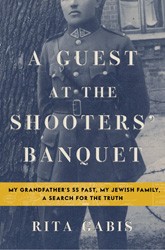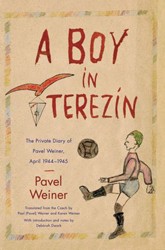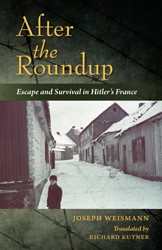By
– January 10, 2012
The titles above, in chronological order, portray the impact of the Shoah on three authors who come from dissimilar backgrounds. Hélène Berr, the 21 year-old daughter of a prosperous assimilated French Jewish family, was forced to quit her studies at the Sorbonne but retained her passionate, brilliant personality despite the horrors around her and recorded them even in the camps, later reconstituting and adding to them in the DP camps; Baruch G. Goldstein, a religious Jew, steeped in Jewish studies, wonders how he can remain a believer in spite of all that has happened; and Carol Ascher, a “second generation” child, suffers from a survivor-father, who intimidates her with his twisted interpretations and ruins her life, and a survivor-mother who operates in some land of denial.
Hélène Berr was a highly talented writer, who wrote both in French and English. In 1942, Berr’s journal is a record of her thoughts about love, music, literature, art, her studies, and the evil around her, as the Nazis begin their campaign of horror. She is a creature of light and strength. She struggles to keep from being filled with hate for all Germans. Her family is so entrenched in Paris that she can’t envision anything happening to her or them. Even in wartime, they live an active social life, while she has four groups of friends and two love affairs. The noose tightens and she surrenders to the facts of the increasing oppression of the Jews, all the Jews. After witnessing the beating and humiliation of a dignified Jewish man, Berr joins the Entraide Temporaire, a secret network to save Jewish children from deportation, until, in 1944, unwisely returning to their own apartment to sleep, the family is caught and she too is sent to Drancy, and from there to Bergen-Belsen where she later dies just before liberation. Her journal had been given to her friend, Andrée, who passed it on to her lover, Jean Morawiecki. His paean to his love, Hélène, is included here, as well as the way in which the journal was transcribed and sent to the French publisher by Mariette Job, a niece.
Baruch G. Goldstein’s memoir is read, not for its literary quality, although it is perfectly clear and flows well, but for his struggle to regain the religious faith that once filled his life. He provides much information on the intense religious life of Jews in his small Polish-German town and communicates the sense of bewilderment and fear felt by the Jews of his town at the random, mystifying, personal violence meted to them by the Germans. He manages to hang on to life, but barely, and then, as a refugee, drifts to UNRRA camps in Italy. He had believed so deeply, that he is bewildered for God seems to have abandoned His people. A yeshivah student, he forgoes going to Palestine when his American relatives urge him to continue his studies in the United States. Some of the most poignant sections are the comfort he feels in having his first American seder in the home of his future wife, while recalling his last seder in the ghetto with his family. He muses on the “miracles” performed by God for the Jews of Egypt, but not for the Jews of the Shoah. He no longer believes in an all-powerful God. It is really his wife, Riva, a deeply religious, warm, compassionate woman, who gently leads him back to belief in God. Slowly, slowly, he comes to practice more of the traditions that he had forsaken in the post-Shoah years. The bulk of the book deals with his marriage and their children, as he eventually becomes a rabbi. After speaking to audiences about the Holocaust, Goldstein rebuts the religious proscription that “Because of our sins we were driven out of our land” stated in the liturgy. Instead he believes:
“…that all Jews who perished in the Holocaust were kedoshim, holy martyrs. This group includes the religious and the nonreligious, the Bundists and he Agudahniks, the Hasidim and the Mitnagdim, the Zionists and the anti- Zionists, and the secular and the assimilated Jews. They were all murdered only because they were b’nei Avaraham, Yitzhak, v’Ya’acov — children of Abraham, Isaac and Jacob, that is, because they were Jews.” He later adds, “While living a religious life of belief in God and faith in God’s goodness, I have become convinced that life without faith is meaningless.”
The first title reviewed above is tragic; the second, tragic, but eventually triumphant, the third (Afterimages), is one of the saddest books I have reviewed in a while. Although Ascher’s father is a Vienna-trained “lay analyst” and was well regarded in Vienna (she thinks, but doesn’t know for sure), and wrote many papers he had no medical credentials. This might have been one of the reasons for his twisted personality. Poor Ascher. Everything she did was colored by her father’s reactions to it and to her. When he occasionally was kind, she basked in a warm glow. Usually, he had a negative psychological analysis of everything she did or said. She lived for his praise and cringed at his violent temper and nasty disparaging of her accomplishments and the normal activities of a teenager. In addition, they had moved to an area that had only vocational schools with courses inadequate for Ascher’s intellect and longing. There is also a second child, a younger sister, who is challenged mentally, and is therefore not the brunt of her father’s acidic reactions. He treats her as a patient. This child is more like Ascher’s mother. She was cheerful to an extent that may have denied reality. Ascher craves the approval of her father and echoes his disdain of her mother, who while superficially cheerful and resourceful, reveals her deepest fears in other ways. Not until she was thirty-five, did Ascher dare to believe she had the right to shape her own life, “irrespective of my father’s wishes or his evaluation of my gifts.” She decides to write and to garner all her courage to send out her work and to call herself a writer.
Additional Books Featured in Review
Marcia W. Posner, Ph.D., of the Holocaust Memorial and Tolerance Center of Nassau County, is the library and program director. An author and playwright herself, she loves reviewing for JBW and reading all the other reviews and articles in this marvelous periodical.





